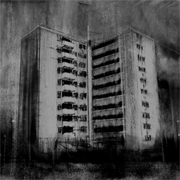It’s often tempting to view the many different projects guided by James Kirby as different facets of the man’s personality. V/Vm was Kirby the prankster with a wry grin, gleefully distorting the contours of ubiquitous pop songs. As The Caretaker the Stockport-born artist delves into the cobwebbed basement of memory, both his own and that of others, mournfully lamenting in its fragility and ultimate loss. As Leyland Kirby he is often at his most emotionally raw, examining, dissecting even, his feelings in the company of his listeners, which makes the experience of albums like Sadly, The Future Is No Longer What It Was and Eager To Tear Apart The Stars both exquisite and somewhat painful. Of all his diverse incarnations, The Stranger remains the most obscure and unfathomable. It’s also the darkest visage Kirby cares to share with the world.
2008’s Bleaklow was rooted in landscape, exploring the northern English moors near where Kirby grew up, and seemed to share an affinity with the dark ambient of Lustmord, Lull, Hoedh et al. Watching Dead Empires In Decay is much more layered and unpredictable in scope. Perhaps Kirby’s environment – he was living in Berlin for a number of years – has rubbed off on him. His work as The Caretaker and under his own name possesses a certain British quirkiness, leading comparisons to be drawn with acts like Demdike Stare and the Ghost Box stable.
This version of The Stranger is less anchored in time and place, but echoes of Berlin’s electronic scene seem to find a resonance in the dense layers of sound that unfurl on Watching Dead Empires In Decay. It’s often just a shuffling beat, quickly swallowed by walls of texture, or a wobbly electronic structure that suggests a whiff of the dancefloor before dissolving, but it’s there, like a ghost fighting against everything else Kirby deploys. These casual insinuations are at times almost imperceptible, but they succeed in destabilising the entire album. It’s not the memory music of his other releases, but it does operate in a world where the fabric of reality is crumbling and frayed, a good reflection of the greying album art (which is superb). In short, Watching Dead Empires In Decay is a wonderful enigma of an album.
From the off the album feels windswept and shadowy, with opening track ‘We Are Enemies But Not Here’ starting with palpable menace, with grumpy-sounding industrial creaks and crashes buffeted by swirling white noise. From there, Kirby evolves the record gradually, dropping in a muted rhythmic pulsation on ‘So Pale It Shone In The Night’, like the sound of tram wheels rolling through a deserted city centre at night, with chimes ringing out forlornly in the background.
The Stranger’s music feels both artificial and earthy, like a combination of electronic devices and snippets of found sounds. ‘Spiral of Decline’ could be the spine of a Raime or Regis track, reduced to the bare bones of beats and creaking electronics, although, again, the exact nature of what is being used is hazy. ‘Where Are Our Monsters Now, Where Are Our Friends?’ is the most enigmatic track on the album, with a backbeat that could have been found on an old synth-pop or trip-hop track filtered through a gossamer curtain of decay and fuzz. If Watching Dead Empires In Decay is an image of Kirby’s world, then it’s a purposefully elusive and nocturnal one, the soundtrack of a man who never sleeps, which, given his output, I’m not sure James Kirby does. Where so much dark electronic music feels cold and impassive, The Stranger’s contains a heart of real warmth and humanity, more sorrow than robotic angst.
This emotional core keeps the album from ever disappearing into the arsehole of formulaic electronica. The Stranger’s identity, as a musical concept, is as vague as the output Kirby weaves. The Stranger could be a ghost, or a Third Man-like figure of mystery and darkness. Maybe he’s intended to be some sort of fusion of man and machine, one of Gary Numan’s replicas. But with Kirby at the helm, the project becomes so much more than a sum of musical parts and obtuse intrigue, crystallising into a very real expression of humanity, albeit one that is blurred and confused. I’m not sure if it was intended or not, but on Watching Dead Empires In Decay, James Kirby succeeds in reminding us of who he is, stranger or not.


